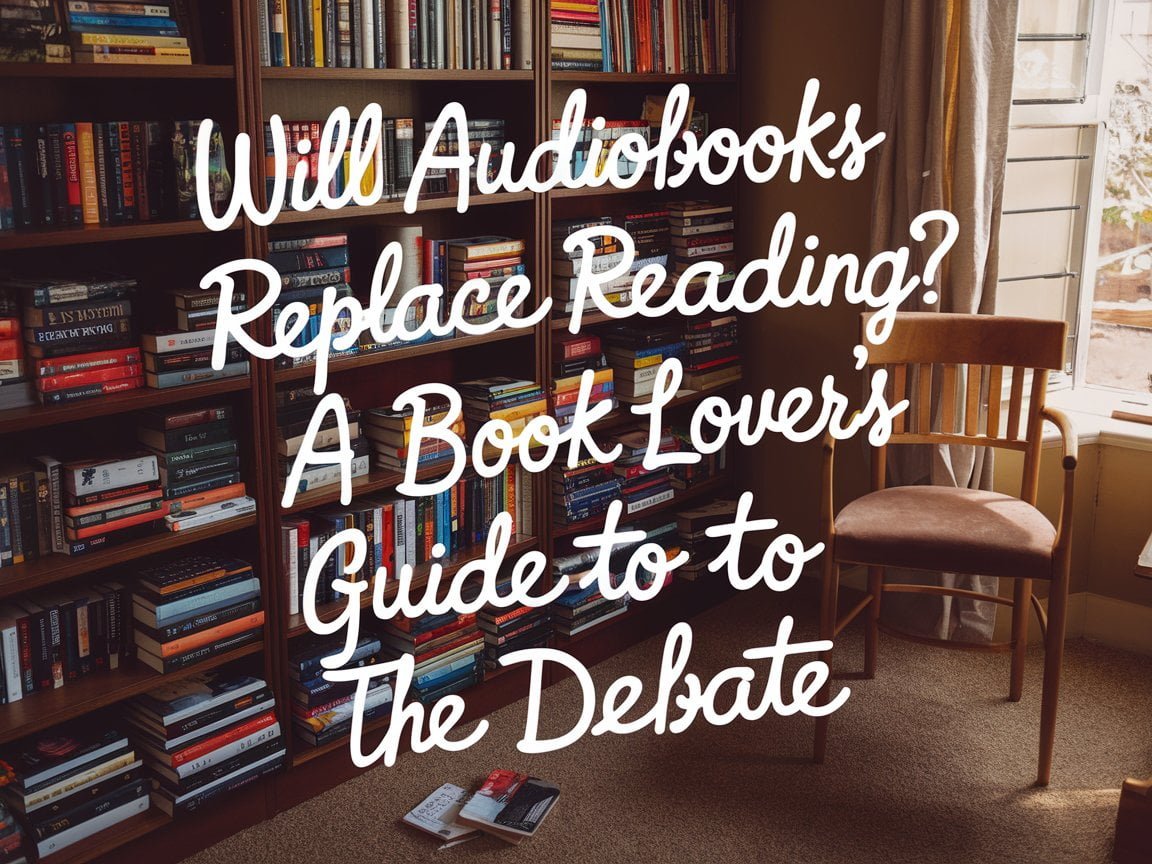For bibliophiles around the world, the tactile pleasure of turning a page, the scent of a new book, and the visual feast of a well-designed cover are integral parts of the reading experience. Yet, in recent years, a new contender has entered the literary arena: audiobooks. As their popularity surges, a question arises in the minds of many book lovers: Will audiobooks replace reading? Let’s dive into this debate with real insights from experts and fellow book enthusiasts.
The Audiobook Boom: Facts and Figures
Before we delve into the heart of the matter, let’s look at some concrete data about the audiobook industry:
- Market Growth: According to the Audio Publishers Association (APA), U.S. audiobook revenue grew 12% in 2020, reaching $1.3 billion.
- Listening Habits: A 2020 survey by the APA found that the average audiobook listener reads or listens to 8 books in the last 12 months, compared to 5 books for non-audiobook consumers.
- Demographics: The same survey revealed that the typical audiobook listener is often also an avid reader of print books, with 94% of listeners having read a print book in the last 12 months.
These figures suggest that audiobooks are indeed on the rise, but are they replacing traditional reading? Let’s hear from the experts.
The Neuroscience of Reading vs. Listening
Dr. Fatima Aziz, Neuroscientist at University College London
“From a neuroscientific perspective, reading and listening to books activate different parts of the brain,” Dr. Aziz explains. “While both involve language processing, reading also engages areas responsible for visual processing and eye movement control.”
Key points:
- Reading may enhance certain cognitive skills more effectively, such as spelling and visual word recognition.
- Audiobooks can improve vocabulary, especially for non-native speakers, as they provide correct pronunciation.
- The brain shows plasticity in adapting to different forms of information intake.
Dr. Aziz’s insight: “Both reading and listening have unique cognitive benefits. It’s not about replacement, but rather about having multiple pathways to engage with literature.”
The Literacy Expert’s View
Professor Maria Chen, Literacy Studies, Oxford University
“Literacy in the 21st century is multifaceted,” Professor Chen states. “It involves not just the ability to decode text, but also to critically analyze, synthesize information, and engage with various forms of media.”
Key points:
- Traditional reading helps develop deep focus and concentration skills.
- Audiobooks can serve as a gateway to literature for reluctant readers or those with reading difficulties.
- The combination of audio and text (like following along in a book while listening) can enhance comprehension for some learners.
Professor Chen’s perspective: “Audiobooks are not replacing traditional reading, but expanding our definition of what it means to ‘read’ in the modern world.”
The Author’s Dilemma
Neil Gaiman, Award-winning Author of “American Gods” and “Good Omens”
“As an author, I’m thrilled that audiobooks are bringing my stories to new audiences,” Gaiman says. “But there’s a magic in the written word that I don’t think will ever be fully replaced.”
Key points:
- Some books are deliberately written with the page in mind, incorporating visual elements or formatting that don’t translate to audio.
- Audiobooks have opened up new creative possibilities for storytelling.
- The intimate experience of reading a physical book offers a unique form of escapism.
Gaiman’s view: “Audiobooks aren’t replacing books; they’re giving stories new ways to come alive. As a writer, that’s exciting.”

The Bookseller’s Experience
Emma Thompson, Owner of Bookworm’s Haven, an Independent Bookstore in London
“We’ve seen a growing interest in audiobooks, but our physical book sales remain strong,” Thompson notes. “Many of our customers enjoy both formats.”
Key points:
- Some readers prefer the tactile experience and “digital detox” that physical books provide.
- Audiobooks have introduced new customers to literature, some of whom then explore physical books.
- Certain types of books, like illustrated works or poetry collections, still primarily sell in print format.
Thompson’s observation: “In our store, audiobooks and physical books coexist peacefully. Book lovers seem to appreciate having options.”
The Librarian’s Perspective
David Park, Head Librarian at Seattle Public Library
“Our audiobook circulation has increased significantly in recent years, but it hasn’t decreased physical book circulation,” Park reports.
Key points:
- Libraries are expanding their digital offerings to include more audiobooks and e-books.
- Many patrons use both formats, depending on their needs and circumstances.
- Audiobooks have helped libraries reach new user demographics, including commuters and multitaskers.
Park’s insight: “Audiobooks are complementing traditional reading, not replacing it. They’re helping us fulfill our mission of promoting literacy and learning in all forms.”
The Audiobook Narrator’s Take
Julia Whelan, Award-winning Audiobook Narrator
“Narrating audiobooks is an art form that brings a new dimension to literature,” Whelan argues. “It’s not about replacing the written word, but offering a different way to experience it.”
Key points:
- Skilled narration can enhance the emotional impact of a story.
- Some complex texts may be more accessible in audio format for certain readers.
- Audiobooks preserve and modernize the oral storytelling tradition.
Whelan’s perspective: “Audiobooks offer a unique way to experience literature. They’re an addition to, not a replacement for, reading.”
The Book Club Organizer’s Experience
Sarah Lim, Founder of “Between the Lines” Book Club
“Introducing audiobooks into our book club discussions has increased engagement,” Lim shares. “It’s given our members more flexibility in how they consume the books we discuss.”
Key points:
- Some members listen to audiobooks during their commute, allowing them to keep up with book club selections despite busy schedules.
- Discussions often include comparisons between the reading and listening experiences.
- The club sometimes chooses audiobooks with full-cast recordings for a unique experience.
Lim’s observation: “Audiobooks haven’t replaced our love for physical books. They’ve just given us more ways to enjoy and discuss literature.”
The Publishing Industry Insider
James Rodriguez, Senior Editor at Penguin Random House
“The publishing industry sees audiobooks as an additional format, not a replacement for print books,” Rodriguez notes.
Key points:
- Many readers consume both formats, choosing based on convenience and preference.
- Audiobooks have opened up new markets and demographics for publishers.
- Some genres, like memoirs read by the author, perform particularly well in audio format.
Rodriguez’s insight: “Audiobooks are expanding the market rather than cannibalizing traditional book sales. It’s a win-win for the industry and for book lovers.”
The Reading Researcher’s Findings
Dr. Laura Simmons, Reading Researcher at the University of Edinburgh
“Our research shows that both reading and listening to books have cognitive benefits, but they engage the brain in different ways,” Dr. Simmons reports.
Key points:
- Reading may lead to better recall of specific details, while audiobooks might enhance gist memory.
- The effort required in reading can lead to deeper processing and potentially better comprehension for some individuals.
- Personal preferences and learning styles play a significant role in whether reading or listening is more effective for a person.
Dr. Simmons’ conclusion: “Both reading and listening to audiobooks have value. The choice between them often comes down to individual preferences and circumstances.”
Conclusion: The Future of Books in a Digital Age
After exploring insights from various experts and book lovers, it’s clear that the question “Will audiobooks replace reading?” doesn’t have a simple answer. Instead, the future of book consumption appears to be one of coexistence and complementarity.
Key takeaways for book lovers:
- Diverse Reading Experiences: Reading and listening offer different but equally valuable ways to engage with literature.
- Accessibility: Audiobooks are making literature more accessible to diverse audiences, including those with reading difficulties or busy lifestyles.
- Complementary Formats: Many book enthusiasts enjoy both formats, choosing based on situation and preference.
- New Creative Possibilities: Audiobooks are opening up new avenues for storytelling and narration.
- Personal Choice: Individual reading styles and preferences will continue to influence the choice between reading and listening.
In conclusion, while audiobooks are certainly changing the landscape of how we consume literature, they are unlikely to completely replace traditional reading. Instead, they represent an expansion of options for book lovers and a new frontier for authors and publishers.
As technology continues to evolve, we may see new forms of “reading” emerge that combine elements of both visual and auditory experiences. The future of literature consumption is likely to be diverse, inclusive, and adaptable to individual needs and preferences.
Ultimately, whether you prefer the feel of pages between your fingers, the convenience of listening while multitasking, or a combination of both, the most important thing is that people continue to engage with and enjoy literature in all its forms. The love of stories and knowledge that books provide is timeless, regardless of the medium through which they are consumed.
So, fellow book lovers, embrace the options available to you. Read a paperback on the beach, listen to an audiobook on your commute, or curl up with an e-book before bed. In the end, it’s not about how you consume books, but about the joy, knowledge, and experiences they bring to your life.





